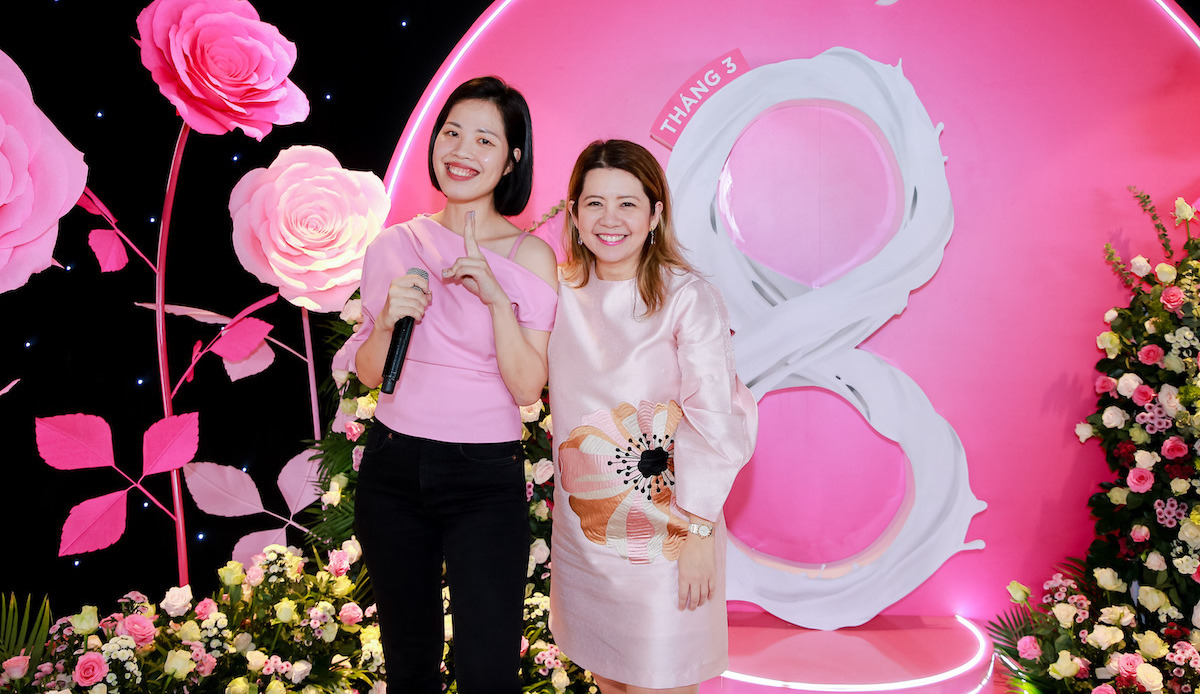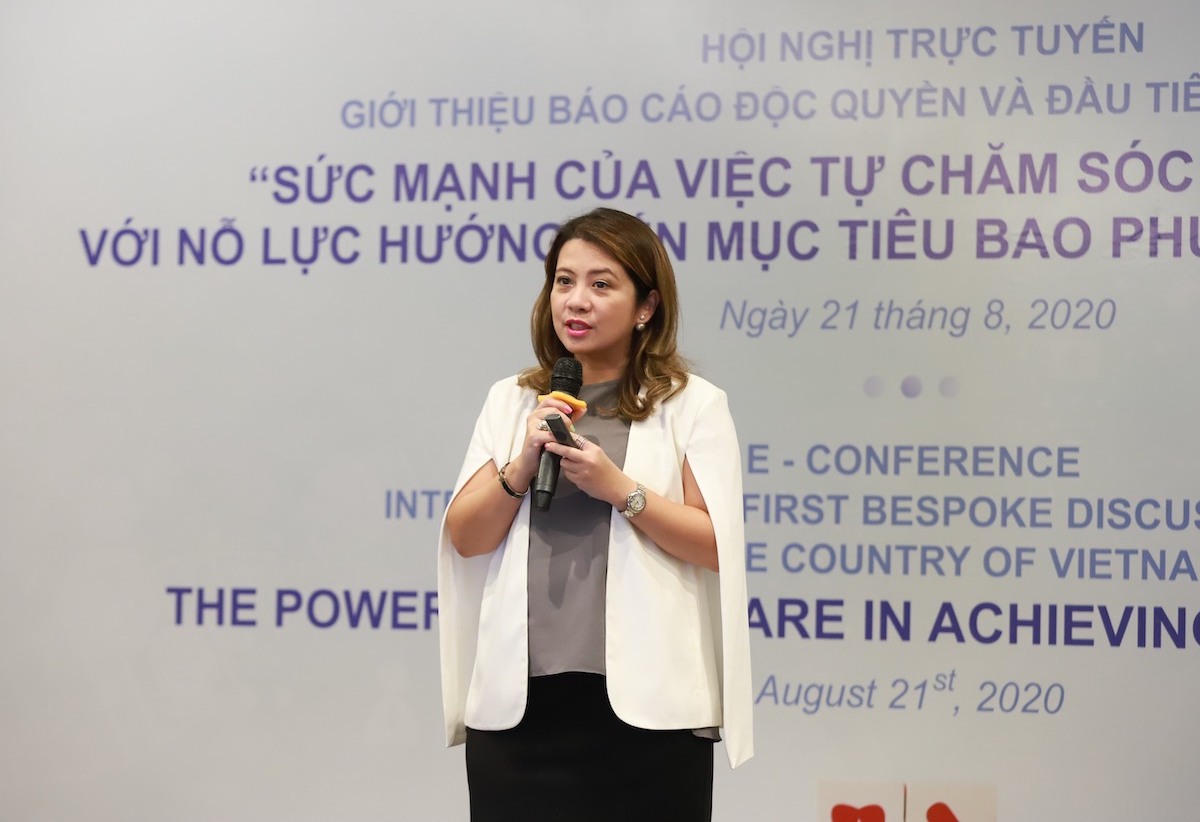Penn Policarpio has come a long way in a short time. Over the past decade, she’s lived in four cities outside her home country of the Philippines, and climbed the ranks at Sanofi, travelling the world with her family in tow through Singapore, Paris, Vietnam and soon, the United Arab Emirates. From 2019 until this summer, she was Sanofi’s General Manager of Consumer Healthcare (CHC) in Vietnam and Cambodia. Now, she’s about to embark on a new challenge as CHC Zone Head for Turkey and the Middle East.
Born and raised in the Philippines, she graduated Cum Laude from the University of the Philippines and briefly worked at Citibank before entering the pharmaceutical industry as a product manager. She’s now spent over 20 years at Sanofi.
Before Penn and her family catch the flight to Dubai to begin their next chapter, we sat down with her to talk about her life journey, women’s representation in the workplace, and her ideas on self care.
As a child, what did you want to be when you grew up?
Living in the Philippines, I was culturally influenced in some ways to want to be a doctor. There was this feeling of it being purposeful and the right path to take if one wants to help treat and cure people, making lives better. That was my dream when I was a small child. Although it didn't come true, I do still get to help people’s health in another way with my job now.

So what influenced your move into pharmaceuticals?
My father actually. It’s a funny story, but my beginnings in this industry also go back to when I was a child. I remember we had this school assignment where we were asked to draw our adult selves. I asked my father for help, and he, who was a district manager at GlaxoSmithKline then, told me to, “Draw a woman behind a desk with a computer.” When I asked him what it was, he said, “A product manager”. Back then it was a little unthinkable for a Filipino woman to become a General Manager (GM), I guess.
It was actually my father that sent my resume to a pharmaceutical company. He wanted me to be safe and secure, and knew that managerial positions in pharma came with a company car back then! I got the job (and the car), and two years later Sanofi hired me.
What kind of challenges have you had to overcome as a woman in your field?
When I was growing up, most General Managers at international companies in my country were men, mostly caucasian, and mostly foreigners. That was almost the status quo. I actually think that’s a part of the reason why my father dreamed of me being a product manager, rather than a GM because there wasn’t much female representation at that level then.
Perhaps another challenge I encountered was how to break down work stereotypes for women. For example, some years back, after returning from maternity leave for my second child, I recall my team in the Philippines went for dinner with our visiting regional head. He was opening up a new position in Singapore, and when I told him I was interested in the role, he was surprised. He told me that he didn’t think I was mobile enough to go abroad since I’d just had a baby and had a husband working in the Philippines. Imagine, would he have thought the same if I were a man returning back from my paternity leave?
Representation, breaking stereotypes, diversity and inclusion are the main challenges. Thankfully now, Sanofi has a really strong program of diversity and inclusion. It’s really improved a lot but there’s still some way to go in order for us to break that glass ceiling.
How important is women's representation in positions of influence?
It’s huge. Representation has a generational impact. It’s so important to be able to look up to someone who looks like you in some way. When I was younger that wasn’t really possible, but now, look at Kamala Harris, Ruth Bader Ginsburg, Sheryl Sandberg. You see people like that and it becomes possible to dream bigger. At her inauguration as US Vice President, Kamala Harris said, “I may be the first, but I won’t be the last”. That struck a real chord with me as I’m sure it did with millions of women.

Do you think about your own influence on your sons, who see their mother doing so well in her career?
I do. I try to impress them with the idea that if they get married and have a family with a woman, it’s totally fine if she is the chief income earner. It should be normal.
My 19 year old actually just moved to Vancouver to study as a sophomore. When we were discussing him going away from our family for the first time, I repeated my usual top 3 pieces of advice to him: Never panic, be optimistic, and be kind. But when everything else fails, ask yourself, “What would your Mama do?”
What would you tell your 18-year old self?
At 18 I was already pretty mature for my age. While studying at university, I was like a mini-parent, taking care of my two siblings since both our parents had gone to the US to work when I was 15! I was attending their parent teacher meetings, taking care of the household budget and many more ‘adult-like’ responsibilities. So, I think I was already quite brave and very much accustomed to taking on challenges then. But I’d tell myself to raise my hand more, to speak up more. I have no regrets, but maybe it would have been good to have moved overseas sooner. Since being mobile and becoming global citizens opens you up to new experiences and opportunities that perhaps I would have had earlier.
So what does a day in your working life look like?
It changes all the time! I spend a lot of time managing present situations — sales and hot topics, then a lot of time discussing strategy and implementing building blocks for the future, trying to create an environment for success. The more we talk about the future, the more we have to talk about people and culture building, since people are the real asset of the organization. With my new role in Sanofi as Zone Head, my focus is on trying to create a collective culture across my zone perimeter and working together even though we might be separated by borders.

How has each of the places you’ve lived changed your outlook on human and community health?
Across markets, I can see that the differences stem from the infrastructure and healthcare system already in place. For example, Singapore differs greatly from Vietnam - Cambodia because insurance coverage is generally very good and there’s better access to medicine even via e-commerce and other channels outside of traditional pharmacies. We’re seeing this come to light in Europe and the US right now, where the Covid-19 vaccine rollout is happening much more quickly than in the rest of the world.
But in general, all the markets I’ve lived in have their respective governments doing their best to improve access to healthcare and patient/consumer care, especially in these times when people are more concerned about their health and well-being. My and Sanofi’s journey involves being sensitive to these socio-economic, regulatory and geopolitical situations, in order to provide access to better healthcare for everyone.
Is there anything companies like Sanofi can do to improve access to healthcare on a policy-making level?
Definitely. At Sanofi, healthcare access is not just about ensuring we manufacture and distribute our products today, but it’s also about addressing consumer needs for the future by securing R&D for future blockbusters.
In terms of policy influencing, this effort takes a whole ecosystem. We need collaboration with governments, healthcare practitioners and even fellow multinational corporations to influence policies that will help improve a nation’s health at scale. Afterall, a healthy population creates a more secure and productive nation.
How do you describe self care personally?
To me it's about taking care of both your mental health and physical health. You need to find that balance, that inner peace in your daily life. We live in such a fast paced, multitasking society that it’s so important to find some moments of pause to regain your perspective and clarity. It might be through yoga, reading a book, even having a nap! Any little way that you can boost your own internal peace.

How does a pharmaceutical company fit into this conversation?
For us, self care is an everyday thing, both mental and physical. By promoting and facilitating self care, we can help create a better future for everyone. Our purpose at Sanofi Consumer Healthcare is “to serve healthier, fuller lives”. We try to bring this to life by providing products which can make a real difference to people’s lives, from prevention to treatment.
Take for example a parent who has to stay home with a sick child, stressed and worried about when their kid will get better. Seeing our products treating that illness, but also providing peace of mind and liberation for the parent — that’s a great testament to self-care, too.
International Self Care Day on July 24th comes in the midst of a lockdown in many parts of Vietnam. What advice would you give people about taking care of themselves in this pandemic?
Firstly, don’t lose hope and know that better times are on the way — let’s be patient and stay safe. In the grand scheme of things, Vietnam’s pandemic response has been really great, and the covid situation here is a lot better still than in other parts of the world. The government is doing a good job in curbing the spread and people here are caring enough to follow the covid guidelines to protect themselves and each other. And, although the vaccine rollout isn’t as fast as desired, it is scaling up, and it’s going to get there.
For taking care of yourself, try to have some “me time”. Try to have some daily moments of pause to ask yourself, “How’s my mental and physical state today? How can I improve it?”
It might be through a home workout, or checking in with friends, or even something more self-indulgent like pampering yourself. As long as you put your wellbeing front and center. You owe this to yourself. And don’t wait until July 24th, do it now — everyday is self care day!




